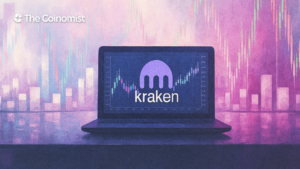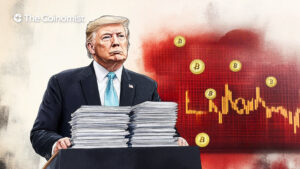Beyond the Tariffs: The U.S.–China Trade War’s Ripple Effect on Crypto

With tariff pressure mounting between the U.S. and China, the crypto market senses opportunity. Bitcoin, once again, is emerging as a possible refuge from geopolitical shocks.
The United States has escalated its trade confrontation with China, announcing plans for sweeping tariffs reaching 104% on a broad category of Chinese imports. The announcement, unsurprisingly, has unsettled both equity and crypto markets.
China, holding firm, has promised to respond — signaling no intent to de-escalate unilaterally.
But this isn’t just about trade. Analysts note that moments like these — when economic stability hangs in the balance — often redirect investor flows into digital assets like Bitcoin, long pitched as a decentralized alternative during systemic stress.
Trade War Update: Tariffs Tighten on China
Under renewed pressure from Trump-aligned policy makers, the U.S. is moving to raise tariffs on major trading partners — with China again in the crosshairs.
As Bloomberg reports, even as diplomatic channels explore side deals with select countries, the proposed duties on Chinese imports could surge to 104% — a signal that rhetoric is turning into hardline economic action.
Check this out: Trump’s Tariffs and Crypto: PitchBook Weighs the Real Risk Ahead
China has drawn its line in the sand, vowing to protect national interests with measured but decisive moves.
- Reuters reports the People’s Bank of China has directed large state banks to reduce dollar purchases — an attempt to shield the yuan from rapid decline.
- Simultaneously, the Tariff Commission has announced a sharp tariff hike on certain American imports, raising duties from 34% to 84% as of April 10, 2025.
Efforts to coordinate with allies have done little to remove the looming threat of escalation.
Experts say that rising tariffs could trigger deeper market stress, with ripple effects that may disrupt the global economy.
Market Markers: BlackRock CEO Warns: Markets Could Drop Another 20% as Recession Takes Hold
Crypto Responds to Global Trade Shocks
New tariffs are already shaking up the crypto space. Some market participants believe that if the yuan continues to weaken, investors will seek safety in decentralized assets like Bitcoin.
Bloomberg notes a trend of increased Bitcoin stability relative to traditional markets — a signal of shifting sentiment.
Arthur Hayes, former CEO of BitMEX, sees Bitcoin as a potential shield for capital when fiat currencies come under pressure.
If not the Fed then the PBOC will give us the Yahtzee ingredients. CNY deval = narrative that Chinese capital flight will flow into $BTC. It worked in 2013 , 2015, and can work in 2025. Ignore China at your own peril,
wrote Arthur Hayes, co-founder of BitMEX, in a recent post on X.
Bybit’s CEO Ben Zhou appears to share Hayes’ take — pointing to a broader sentiment shift among crypto insiders.
Read more: Arthur Hayes Challenges Fed Independence in His New Essay “The BBC”
While near-term volatility remains elevated, structural support is emerging in crypto markets — driven by conservative positioning in derivatives and proactive regulatory announcements.
Economic pressure from ongoing tariff shifts continues to reverberate across the global financial system.
While actions from both governmental superpowers are adding risk to the equation, the resilience of digital assets as a capital destination offers a measured source of hope — one that may define the near-term narrative.
The content on The Coinomist is for informational purposes only and should not be interpreted as financial advice. While we strive to provide accurate and up-to-date information, we do not guarantee the accuracy, completeness, or reliability of any content. Neither we accept liability for any errors or omissions in the information provided or for any financial losses incurred as a result of relying on this information. Actions based on this content are at your own risk. Always do your own research and consult a professional. See our Terms, Privacy Policy, and Disclaimers for more details.

























